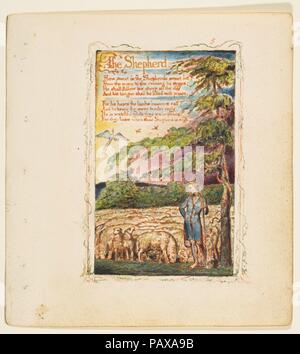
In response, the sheep are “in peace,/For they know when their Shepherd is nigh.” The capitalization of “Shepherd” throughout the poem suggests the Divine Shepherd, Jesus Christ, who watches over his church “from the morn to the evening” while constantly creating beauty, just as the poetic shepherd does in Blake's present work. “He is watchful,” Blake writes, indicating the shepherd's role s caretaker over his flock. The shepherd's blessed life is not one merely of relaxation, however. These songs of praise echo the song sung in the Introduction, leading the reader to see the following poems of Songs of Innocence as the shepherd’s pastorally-inspired, spontaneous songs. In contrast to the busy life of the urban dweller, the shepherd needs only to follow his sheep, listening to their innocent cries and singing songs of praise. Blake’s own disenchantment with the city is implied here in his paean to the shepherd’s rural life. The image of the lamb is again used, but this time “lamb” is a common noun, and not overtly meant to be a representation of Jesus Christ, although that connection remains. The tone moves from one of energetic joy to one of somber peacefulness.īlake shifts from the first-person shepherd of the “Introduction” to a third-person description of the idyllic shepherd’s lot in life.

The second stanza shifts to the peace of nighttime, when the shepherd is quiet so that he may “hear,” a word repeated twice in this stanza, and be “watching” over the sheep. The first stanza involves the shepherd actively making noise, as his “tongue” follows the sheep to direct them throughout the day. “The Shepherd” is a poem of two quatrains, each following the ABCB rhyme scheme. He has nothing to listen to but the “innocent call” of the lamb and the “tender reply” of the ewe. The shepherd has no fixed workplace, must only follow his sheep, and has “songs of praise” on this tongue constantly. Thus we see that Blake is more practical than theoretical with regard to his dogma or maxim of religion.The poet romanticizes the shepherd’s “sweet lot” in life. More than referring to Christ ‘the Shepherd’ may also refer to man whose charity and broad heartedness is the core and kernel of all religions, as well as that of Christianity. This may hint at the fact that the Shepherd, as he does in the present world, ‘shall’ follow his flock and sing halleluiahs in the other world also. All the other lines are in present tenses whereas the third and fourth are in the future tense. Something which is noteworthy in the poem lies in the third and the fourth lines. Human beings are happy under the protection or blessings of God. The Shepherd stands for God or Christ and the sheep represent human beings.


Rather more than the lovely scenery of a landscape with a few sheep and a shepherd, it has a deeper symbolic meaning. In the first line of the poem, ‘Shepherd’ begins with a capital letter. ‘The Shepherd’ is a part of William Blake’s poetry collection “Song of Innocence”. The flock of sheep sense the proximity of the shepherd and feel safe and sound. He guards them while they are grazing peacefully. He feels happy and peaceful in the mind as he is always among his sheep who let out innocent calls. Besides, his tongue is employed in singing songs in praise of God. The poem is mainly about a Shepherd who enjoys an enviable lot because he roams from morning to evening all along the valleys. And his tongue shall be filled with praise.įor they know when their Shepherd is nigh.


 0 kommentar(er)
0 kommentar(er)
